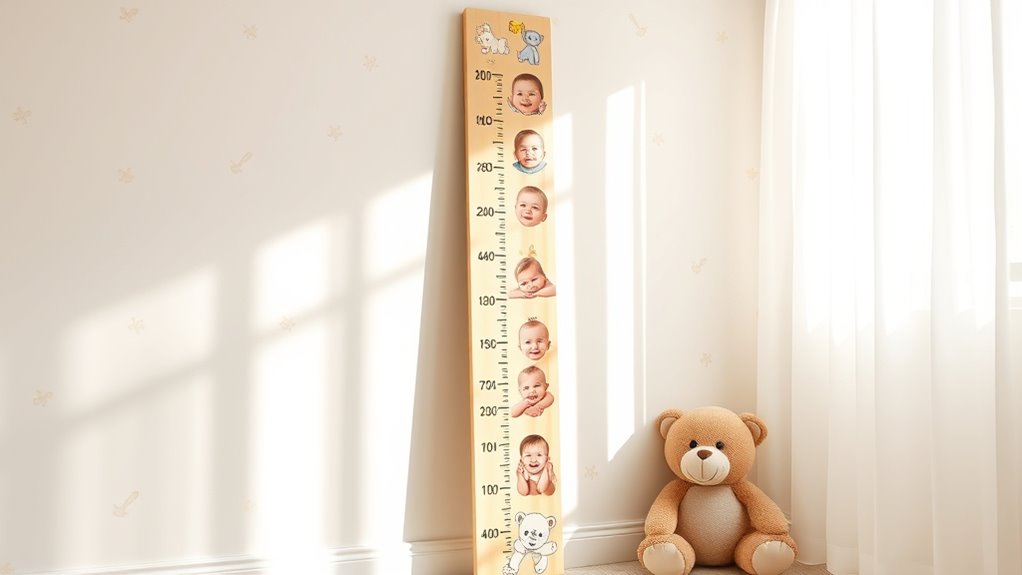Milestones mark your baby’s growth, helping you track their development. By four months, you’ll see them smiling and reaching for toys. At six months, they’ll start rolling over and babbling. As they approach nine months, they may crawl and show stranger anxiety. By their first birthday, they’ll likely say “mama” or “dada” and express affection. Understanding these stages is crucial for your baby’s progress, and there’s so much more to discover about their journey ahead.
Key Takeaways
- Physical milestones include rolling over, crawling, and climbing stairs, indicating growth in motor skills and coordination.
- Cognitive milestones show progress in recognizing faces, responding to sounds, and following simple directions as the baby develops understanding.
- Language development milestones feature cooing, babbling, and saying familiar words, marking communication skills advancement.
- Social-emotional milestones demonstrate attachment to caregivers, expressions of affection, and recognition of strangers, reflecting emotional growth.
- Regular checkups and monitoring are crucial to ensure the baby is meeting developmental milestones and addressing any concerns promptly.

As your baby grows, it’s essential to understand the various milestones they’ll reach along the way. Each baby develops at their own pace, so don’t worry if your little one reaches some milestones earlier or later than others. These milestones track progress in several areas, including physical growth, cognitive skills, language development, and social-emotional growth. Recognizing these milestones helps you identify any delays early, allowing for timely interventions if needed.
Let’s start with physical development milestones. By four months, your baby should be able to push up on their arms while lying on their tummy. As they approach five months, they’ll begin rolling over in one direction, and by six months, they’ll master rolling over both ways. At seven months, you might notice them starting to crawl, scoot, or attempt an “army crawl.” By nine months, they may even try to climb or crawl up stairs, so make sure your environment is safe for their newfound mobility. The ability to raise head and chest when on tummy develops is an important foundation for these movements.
Cognitive development is just as crucial. At two months, your baby will start recognizing faces and responding to sounds. By four months, they’ll begin to babble and reach for toys. At six months, you can expect them to respond to sounds by making noises themselves. By nine months, they’ll understand “no” and enjoy playing peek-a-boo. By their first birthday, they should be able to follow simple directions, showcasing their cognitive growth.
Language and communication skills develop rapidly during this time. Your baby will make cooing noises by two months and start babbling by four months. At six months, they’ll babble and respond to sounds. By eight months, they should be responding to familiar words, and by twelve months, they might even say “mama” and “dada.”
Social and emotional development also progresses significantly. By four months, your baby will smile and show interest in faces. At five months, they’ll reach for caregivers and may cry when out of sight. Expect them to exhibit stranger anxiety by nine months and wave goodbye by ten months. By their first birthday, they’ll express affection for familiar people, highlighting their developing social skills.
As you support your baby’s growth, engage in positive interactions and age-appropriate activities. Regular checkups with healthcare providers are essential to monitor progress and address any developmental concerns promptly. With your involvement, your baby will thrive and explore the world around them confidently.
Frequently Asked Questions
How Can I Encourage My Baby to Reach Milestones Faster?
To encourage your baby to reach milestones faster, focus on creating a supportive environment.
Engage in tummy time to strengthen muscles, and provide age-appropriate toys that stimulate their senses.
Encourage exploration by allowing them safe space to move.
Regularly practice skills like standing and crawling, and incorporate play that promotes problem-solving.
Don’t forget to read and talk to your baby, as social interaction and language stimulation are crucial for their development.
What Should I Do if My Baby Misses a Milestone?
If your baby misses a milestone, don’t panic. First, monitor their progress closely and note any delays.
It’s important to consult your pediatrician if you have concerns; they can evaluate your baby and provide guidance. Documenting your baby’s development with notes or videos can be helpful for your doctor.
Are Milestones the Same for All Babies?
Think of milestones like unique footprints in the sand; each baby leaves their own mark. Milestones aren’t the same for all babies. They grow at their own pace, influenced by factors like genetics and environment.
Some might roll over early, while others take their time. It’s crucial to remember that each child’s journey is distinct. Instead of comparing, focus on celebrating your baby’s progress and seek guidance from healthcare providers when needed.
How Do Genetics Affect My Baby’s Growth Milestones?
Genetics play a significant role in your baby’s growth milestones. They influence not just physical size but also cognitive and motor development.
Variations in genetic factors can lead to differences in when your baby reaches specific milestones. While genetics set a foundation, environmental factors, like nutrition and stimulation, also impact growth.
Understanding this interplay can help you support your baby’s development effectively, ensuring they thrive in their unique growth journey.
What Resources Are Available to Track My Baby’s Milestones?
To track your baby’s milestones, you’ve got several great resources at your fingertips.
The CDC Milestone Tracker App allows you to monitor development through illustrated checklists and tips. You can also access online checklists on the CDC website, which can be shared with healthcare providers.
Additionally, developmental guides and educational resources from organizations like PBS Kids offer valuable insights and activities to support your child’s growth.
Conclusion
As you watch your little one reach each milestone, it’s like witnessing a delicate flower bloom, each petal unfurling with joy and wonder. The first giggle, the first step—these moments are bright, fleeting sparks in the tapestry of their growth. Embrace these beautiful changes, for they’re not just markers of development; they’re memories in the making. Cherish each laugh and stumble, as they weave a vibrant story of discovery, love, and endless possibilities for your baby’s future.









